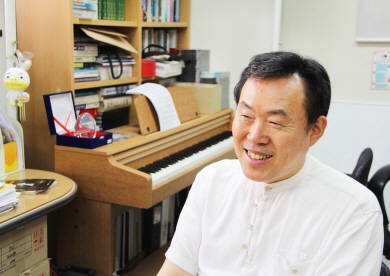
Many people assumed that the composer of this prominent melody would be a professional composer. Contrary to this general assumption, the composer actually turned out to be a business professor – professor Kym Hyo-gun (Business Administration) at Ewha Womans University.
Regarding his song being used for the Sewol incident, professor Kym expressed sincere condolences to the victims and their families.
“Even though I did not intend to make this song for the Sewol ferry incident, I am satisfied as a composer that my song is used for such purpose,” professor Kym said. “I wanted to heal people’s mind with my music.”
Professor Kym had initial ties with music when he continued playing the piano since his elementary school years. However, it was during his middle school period that he started to passionately love music. He started to serve as a piano player in the school choir.
His teacher from the choir influenced him a lot during that time. The teacher told him about great musicians and often took him to the schools’ choir. These experiences deepened his passion toward music and made Kym practice piano and guitar more to express his feelings well. As he practiced the instruments harder, the urges to create his own music grew inside him.
“There are phases of my passion,” professor Kym said. “First you get shocked from what you experienced, then you try to imitate things that impressed you, and lastly you desire to create something of your own.”
But his parents, thinking that being a musician was pathetic, wanted their proud son to get into law school. They were worried that Kym’s passion toward music might lead him to a “wrong path.”
After a confrontation between professor Kym and his parents, they finally reached an agreement that once Kym gets into a prestigious university, he would be free to do whatever he wants.
Eventually Kym was admitted to Seoul National University as an economics major. There, he started taking music classes such as harmonics and composition.
With the knowledge he learned from these music classes, he composed his own songs and sung them with his band which he played with his friends.
While composing music for fun, in 1981, professor Kym submitted his song “Snow” to the university gesang contest. To everyone’s surprise, his song won the first prize and became a huge issue because an economics student had won a music contest.
“I think the reason why I won the contest is mainly due to the fact that I can write both lyrics and melody,” professor Kym said. “So I knew what melody would best suit my lyrics and vice versa.”
Professor Kym continued to pursue his music during his doctorate course. However, as he became a professor at Ewha in 1992, he suddenly felt responsibility as the head of household and stopped his musical activities including composing music, and even going to concerts.
“I suppressed my desire to enjoy music,” professor Kym said. “I thought my passion toward music might make me care less about my career or my family.”
However, when both of Kym’s parents passed away in 2007, he started composing music again to comfort his sadness. In the following year, he released his new song “A Thousand Winds,” which received a great welcome from the public.
Many think being a business professor and composing music are two very different things and wonder how it would be possible to juggle between these two different jobs.
“People think business and music don’t have a common ground,” professor Kym said. “However, in a larger sense, every activity human beings do have some similarities. In this regard, music and business share the same values: harmony and balance.”
According to professor Kym, when harmony and balance are lost in business, problems occur in producing and selling products. In music too, harmony and balance are the most important factors and musicians instinctively know these values.
In this sense, professor Kym advises Ewha students who might have worries about doing two things at once to have courage and try whatever they want.
“Be brave and just do it,” professor Kym said. “When people cannot decide what to do between two things, one thing is usually what they actually do not want to do, but what they feel they should do because of social pressure. And the other is what they really want to do. So it is okay to just follow where your heart leads, even though it may seem reckless to others.”
Yoon Hye-joon
hajun1237@ewhain.net

